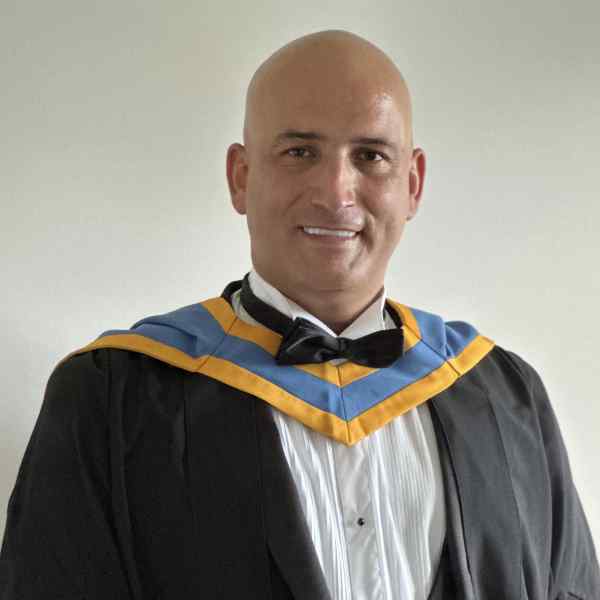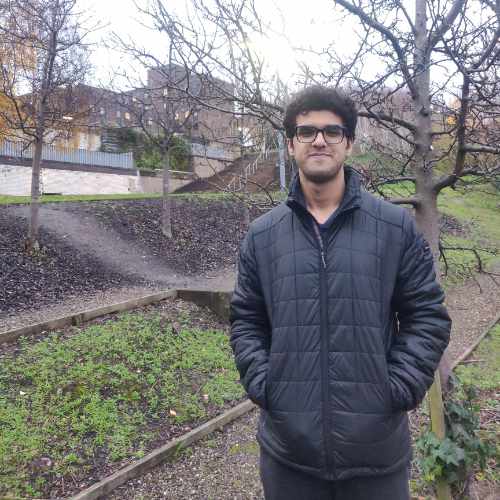MSc Electronic & Electrical Engineering
ApplyKey facts
- Start date: September & January
- Accreditation: Institution of Engineering & Technology
- Study mode and duration: 12 months full-time
Industry Engagement: Competitive internship opportunities
Study with us
This MSc is specifically designed for students who wish to develop expertise across the entire electronic and electrical engineering discipline. You’ll:
- study a comprehensive, future-focused curriculum, blending core engineering principles with key emerging technologies and systems
- gain insight into real-world challenges and build valuable professional connections through industry engagement
- tailored to your career goals – choose from a wide range of advanced subject options, shaping the course to align with your professional interests.
Why this course?
This MSc is aimed at ambitious students who want to shape the technologies that power our world. The course offers a unique opportunity to explore advanced subject options across the entire electronic & electrical discipline, allowing you to build a personalised MSc course to meet your individual career goals and ambitions. Whether you're interested in embedded electronics, power systems or intelligent automation, the course provides the flexibility to specialise while building a strong foundation in core engineering principles.
You’ll have access to purpose-built facilities equipped with industry-standard tools and benefit from teaching informed by cutting-edge research and real-world industry needs. With opportunities to engage with industry partners and work on practical projects, you’ll gain valuable experience that enhances your employability.
Designed to provide both academic depth and practical relevance, this MSc prepares you to excel in diverse engineering environments and contribute to the next wave of technological innovation.
What you’ll study
You’ll study a selection of thematic taught modules exploring all major elements of the electronic & electrical engineering discipline. These modules are designed to develop advanced technical understanding, enhanced with the leadership, project management and professional engineering skills sought after by employers.
MSc Project
Students who pass all required taught modules will progress to the MSc Project, undertaken between May and August. This involves an in-depth investigation on a topic of your choosing within the electronic or electrical engineering domain. Projects may be:
- research-based, aligned with current departmental research themes, or
- industry-based, conducted as an internship with one of the department’s partner companies ( link to the new Industry engagement page)
While all projects are designed to address real-world engineering challenges, the competitive internships offer additional benefits, including:
- site visits
- access to relevant technical data and facilities
- mentorship from an industry professional
This course structure ensures that you graduate with not only academic knowledge but also practice experience and industry insight.
Check key dates for your MSc and the University academic session.
Course directors
September entry
“Our strong links to sectors including electrical supply and distribution, telecommunications and aerospace ensure students develop applied, practical expertise ideal for their future careers”.
January entry
“The unique flexible curriculum enables students to explore a diverse range of advanced topics across electronics, electrical power and engineering data analytics”.

Hear about Vasitpol’s MSc experience
Originally from Thailand, Vasitpol Sangtong chose to join Strathclyde for his MSc study. Discover how he got on:
Strathclyde is a great place to learn, and this course offered the flexibility I needed
Vasitpol Sangtong
Compulsory module
Assignment & Professional Studies (20 credits)
The aim of this class is to provide you with support for your general academic and professional development.
You'll undertake an advanced investigation of an electronic or electrical engineering topic of your choice, to enhance your learning, and develop presentation and communication skills.
Optional modules
You’ll study no fewer than 100 credits of optional modules. Please note that below is an indicative list of these, reflecting the curriculum in the current year. The modules are subject to change, but are likely to include:
Advanced Power & Energy Systems (20 credits)
This class will allow you to understand, critically analyse and assess technical requirements for power system operation, management and planning. It will enable you to carry out advanced types of power system analysis as well as understand and use results from these analyses in power system operation and planning. You'll also develop an advanced knowledge of the main concepts related to the function, design and operation of protection schemes for distribution, transmission and generation applications.
Power Electronics, Machines & Applications (20 credits)
You'll develop an understanding of the principles of common power electronic systems. You'll gain familiarity with the techniques required to analyse common power electronic circuits and learn about the basic principles behind the design of rotating electrical machines. The techniques required to analyse basic DC and AC machines will also be investigated.
You'll learn to recognise that disturbances exist within a power system substation, appreciate that these disturbances may affect electromagnetic compatibility and become competent in dealing with the implications of those disturbances.
You'll gain an understanding of the use of power electronic devices, drives and machines for given applications, specifically for electric vehicles. You'll examine the range of energy sources capable of powering ‘independent’ EVs, how these sources work, their performance and degradation issues and how to charge/fuel them.
Power System Design, Operation & Protection (20 credits)
The objective of this class is to enable you to appreciate the principles of analysis, design and protection of electrical power systems including:
- the design and operational approaches in power systems including electricity generation, transmission and distribution
- the analysis and design of transmission and distribution networks
- power flow, fault and stability calculations
- power system control including load frequency control and economic dispatch
- generation technology implications on power system design and operation.
You'll also study the main concepts related to the requirements, functions, design and operation of protection schemes for power system transmission and distribution systems. You'll gain an advanced understanding of selected protection schemes used in transmission and distribution networks.
Digital Signal Processing Principles (20 credits)
This class covers the fundamentals of discrete time convolution, correlation, transform methods, time frequency signal representation, downsampling/upsampling and digital filters that are core to state of the art machine learning and deep learning architectures. The class has an integral Matlab based laboratory set of tasks that students are required to undertake.
Information Transmission & Security (20 credits)
The aim of this class is to develop an understanding of the principles by which information can transmitted with varying levels of security and the techniques by which communication systems can be analysed and designed.
Control Principles (20 credits)
This module aims to introduce the basic concepts, mathematical tools and design methods of classical control theory. It also introduces students to advanced control methods and provides a basic understanding of a time-domain approach to control analysis and the design of industrial processes.
The module covers: First and second order systems, delay process, simple saturation models; Simulation tools such as GUI, SIMULINK, MATLAB; Control system performance, transient and steady-state figures of merit, time domain step response, reference tracking and disturbance rejection in time domain; Simple control principles; State space representation of linear systems; Continuous time and discrete-time system fundamentals: eigen-values & eigen-vectors, stability, controllability & observability, canonical forms for systems; State-space control methods: pole placement state feedback control with/without observer design and linear quadratic optimal control.
At the end of this module students will be able to:
- model simple systems with transfer function and state space representation, create simulations using MATLAB and Simulink
- analyse linear open loop and closed loop systems both in frequency and time domain
- understand the theoretical and practical implications of feedback control systems, design control systems using simple PID tuning methods
- assess control performance, make analytical calculations and critical evaluation of control performance-related metrics
- apply and understand the advanced control methods, principles and applications in an industrial context
Assessment and feedback is in the form of a coursework and class test in Semester 1 (15%), a project report (15%) and exam (70%) in Semester 2.
High Voltage Technology & Electromagnetic Compatibility (20 credits)
This class will introduce you to the fundamentals of high voltage electrical insulating systems and the principles, mechanisms and characteristics of high voltage discharges in vacuum and condensed media. It will also provide you with a basic understanding of the behaviour of dielectric materials stressed with electric fields and their use in high voltage systems. You'll also gain an understanding of the principles of high voltage generation and impulse testing of the high voltage systems.
Power Electronics for Energy & Drive Control (20 credits)
Modern energy conversion systems rely on the integration of range of technologies including power electronics, electromechanical actuators and energy storage elements. This class will build knowledge of the building block technologies and show their application to modern energy conversion systems.
Power System Economics, Markets & Asset Management (20 credits)
This class will present and give an understanding of the economics, trading and pricing of electricity supply and how it is shaped by technical, commercial and regulatory considerations.
It will give you an understanding of power system economics under an environment of multiple suppliers and users, and present the challenges, technologies and value of asset management within an electricity supply industry context. You'll gain a deep appreciation of factors affecting security of supply and how it might be quantified.
Wind Energy & Distributed Energy Resources (20 credits)
This class will provide an understanding of the principles of wind turbine power generation with attention to the wind resource, rotor aerodynamics, structural design, power conversion and control.
It will also examine the socio-economic issues relating to wind power and provide an underpinning in distributed energy resources including small scale generation, energy storage and demand management and their integration and management within power networks.
Advanced Digital Signal Processing Principles (20 credits)
The objective of this class is to ensure you develop the necessary skills that will allow you to analyse, design, implement and simulate advanced DSP techniques and algorithms for a variety of communications and general engineering problems.
Embedded Systems Design (20 credits)
This class provides hands-on experience in translating Digital Signal Processing concepts into real-time embedded systems applications.
Through a combination of lectures, up-to-date technical discussions and hardware programming, you'll learn to design and implement real-time embedded systems through familiarisation with Digital Signal Processors and FPGAs.
Image & Video Processing (20 credits)
This class will provide an introduction to the techniques relevant to digital images and video. This includes techniques both to process images and video and also to efficiently compress and communicate them.
The class will give you a comprehensive understanding of various image and video processing and coding standards. You'll also study some key applications of these standards.
Software Engineering (20 credits)
This class will introduce you to the software engineering process through the development and application of C++ programming skills. You'll become competent in specifying, designing and developing software and in writing and testing programs of moderate complexity.
MSc Project
Students who successfully pass all required taught modules will progress to the MSc Project.
MSc Project (60 credits)
The aim of the research project is to provide you with an opportunity to bring your knowledge and skills together and deploy them in a significant practical investigation, using relevant engineering literature, and where relevant, initial experiments or simulations.
Compulsory module
Assignment & Professional Studies (20 credits)
The aim of this class is to provide you with support for your general academic and professional development.
You'll undertake an advanced investigation of an electronic or electrical engineering topic of your choice, to enhance your learning, and develop presentation and communication skills.
Optional modules
You’ll study 100 credits of optional modules, with 40 credits chosen from List A (September to December Semester) and 60 credits from List B (January to April Semester). Note the January start MSc project runs during the May to August Semester. Please also note the below list of modules are subject to change, but are likely to include:
List A
Hardware IoT Communication System and Design (10 credits)
This module aims to provide practical experience of designing a Radio Frequency (RF) capable Internet of Things (IoT) Printed Circuit Board (PCB), featuring a radio, embedded processor, expansion hardware, sensors and digital interfaces, along with an understanding of design considerations and practices.
Data Analytics and AI for Energy Systems (10 credits)
The purpose of this module is to introduce the applications of data analytics and Artificial Intelligence techniques to power systems problems. Increased data availability from monitoring in power and energy systems results in high volumes of data which cannot be used to their full potential if manually assessed. This motivates the need for system intelligence to automate tasks and better inform processes through predictive capabilities.
Concepts are introduced via practical examples and industry case studies, allowing students to see where domain expertise can be supported by intelligent systems. The course is assessed with two assignments: one literature-based research exercise and a practical analysis of industry-sourced data. The first assessment is a research exercise to prepare a state-of-the-art review paper. The list of topics covers assets discussed in detail through the lecture series, and students must write about the drivers and needs for condition monitoring data analytics, the state-of-the-art commercial systems and academic research, and identify candidate techniques. The second assessment is a mini-project to implement and test a data-driven analysis technique.
A lab session introduces students to the use of Matlab for analysis of operational transformer data using machine learning techniques. Students are asked to compare and contrast models of their choosing and report on the performance observed and resulting operational implications.
Offshore Wind Farms O&M and Economics (10 credits)
This module aims to fully educate students on the operational challenges and solutions facing offshore wind operators. This will be approached both in terms of:
- O&M planning for project development and final investment decision
- post-warranty asset transfer
- day-to-day operational decisions
- and finally, repowering and life extensions
Students will be able to identify key operational choices and how these manifest in operational metrics (such as availability, OPEX, yield targets). Post-subsidy operation for offshore wind will also be discussed.
Principles of High Voltage Technology (10 credits)
This module aims to:
- introduce the fundamentals of high voltage electrical systems and insulating strategies
- provide an understanding of the principles of high voltage diagnostic systems
- provide an understanding of lightning and lightning protection approaches
- provide an understanding of the main principles of grounding of high voltage systems
- provide an understanding of the fundamental principles of electromagnetic compatibility
- appreciate electromagnetic compatibility aspects in relation to power systems
Power Electronics Principles (10 credits)
Modern energy conversion systems rely on the integration of a range of technologies, including power electronics, control and system integration. This module will develop knowledge and understanding of these technologies and give the student experience in analysing their performance and selecting and designing systems for modern energy conversion systems.
Software Design and Programming for Engineering (10 credits)
This module aims to introduce students to the Python programming language, and enable them to design, implement and test useful Python programs.
Neural Networks and Deep Learning (10 creidts)
This module provides the background and skills required to develop Artificial Intelligence systems based on Neural Networks and Deep Learning. Students will learn the theoretical as well as practical foundations of Machine Learning and Neural Networks for an engineering context. Lab exercises augment the taught classes to deepen the learning experience.
Energy Decarbonisation Technologies (10 credits)
This module aims to provide an introduction to the key technologies of energy decarbonisation in heat networks, and transportation (Electrical vehicle, and aerospace).
These associated technologies encompass battery and fuel cells, charging technologies, hydrogen networks, and vehicle designs, interconnected within domains such as electricity, energy, and transportation networks.
List B
Intelligent Sensing and Reasoning through Machine Learning (10 credits)
This module provides the background and skills required to develop autonomous systems based on Machine Learning and Artificial Intelligence. Students will learn the theoretical as well as practical foundations of Data Science (Machine Learning, Deep Learning) for a design and engineering context. Laboratory exercises augment the taught classes to deepen the learning experience.
The appreciation of responsible data collection and model training and the responsible design of sustainable solutions is a "golden thread" that runs throughout all lectures.
Image Processing (10 credits)
This moduel aims to provide an introduction to the techniques relevant to digital images. This includes techniques both to process images and also to efficiently compress them. The module will give the students a comprehensive understanding of various image processing and coding standards. The students will also study some key applications of these standards
Wind Generator Modelling and Control (10 credits)
This module aims to provide students with a fundamental understanding of the control of electric generators via power electronics for wind power applications. The module revises all the relevant theory in electric machines and power electronics required to perform electrical and mechanical generator control. As such, this course is suitable for non-specialist engineers.
Information Transmission and Physical Layer Communication (10 credits)
Impart an advanced understanding of the principles by which information can be transmitted with varying levels of security and the techniques by which communication systems can be designed and implemented for wireline and wireless communication, with a particular emphasis on the physical layer implementation.
Power Electronics Devices, Drives, Machines & Applications (10 credits)
In this module, you will develop an understanding of the basic principles behind the design of rotating electrical machines and gain familiarity with the techniques required to analyse basic DC and AC machines and circuits.
Power System Analysis and Protection (10 credits)
This module aims to enable students to appreciate the principles of analysis, design and protection of electrical power systems, including:
- design and operational approaches in power systems, including electricity generation, transmission and distribution.
- analysis and design of transmission and distribution networks
- power flow and fault calculations
- the main concepts related to the requirements, functions, design and operation of protection schemes for power system transmission and distribution systems
Control Principles 1 (10 credits)
This module aims to:
- introduce you to the basic concepts, mathematical tools and design methods of classical control theory
- enable you to use analysis and design tools used in control engineering.
- enable you to analyse and design closed loop control system, specifically using industrial three-term (PID) controllers.
- appreciate the application of control theory in industrial applications.
Power System Economics and Markets (10 credits)
This module aims to:
- present and give an understanding of the economics, trading and pricing of electricity supply and how it is shaped by technical, commercial and regulatory considerations
- give an understanding of power system economics under an environment of multiple suppliers and users.
Wind Energy and Distributed Energy Resources 1 (10 credits)
This module gives an overarching understanding of the principles of wind power generation, the management of wind farms and their place in the wider power system. The course will cover the wind resource, rotor aerodynamics, wind turbine anatomy, the technologies used and their variations. This will provide an understanding of the lifecycle of a wind farm from site assessment to repowering and decommissioning.
Advanced DSP 1 (10 credits)
This module helps to develop the necessary skills that will allow you to analyse, design, implement and simulate advanced DSP techniques and algorithms.
Embedded System Design 1 (10 credits)
Design and implementation of real-time embedded systems through familiarisation with Field Programmable Gate Arrays (FPGAs) and System on Chip (SoC) devices via lectures, up-to-date technical discussions and hardware design.
This course provides hands-on experience in translating Digital Signal Processing concepts into FPGA-based embedded systems applications.
Industrial Sensor Technologies (10 credits)
This module will provide the student with a broad appreciation of modern sensor technologies and their implementation in industrially relevant applications.
Solar Energy Systems (10 credits)
This module offers understanding of the solar energy industries, including resources, technologies, practical implementation, development, barriers, environmental and sustainable issues. The students will gain familiarity with the techniques required to analyse common solar energy systems that comprise PV system and to enable them to carry out analysis and design of these components.
Energy Storage Systems (10 credits)
This module offers understanding of how current and future energy storage systems operate and how these can be used to deal with the variable nature of the demand and supply on the grid in particular due to the intermittent nature of renewable electrical energy sources. The students will gain familiarity with different energy storage technologies. A case study of battery based system will be carried out to learn how to design these components.
MSc Project
Students who successfully pass all required List A taught modules from the January to April Semester will progress to the MSc Project in the May to August Semester and continue to the List B taught modules in the September to December Semester.
MSc Project (60 credits)
The aim of the research project is to provide you with an opportunity to bring your knowledge and skills together and deploy them in a significant practical investigation, using relevant engineering literature, and where relevant, initial experiments or simulations.
Learning & teaching
The MSc is delivered through a blended learning approach, combining both in-person and online methods to provide a flexible and engaging educational experience. Teaching methods include:
- lectures (in-person & online)
- problem-solving tutorials
- hands-on, project-based laboratory sessions
This approach is designed to equip you with advanced technical expertise, while also developing essential leadership, project management, and professional engineering skills.
Each module typically includes:
- five hours of direct contact time per week
- at least five additional hours of independent study, supported by the University’s virtual learning environment, digital research resources, & library facilities
This structure encourages you to take an active role in your learning and to deepen your understanding through self-directed exploration and research.
Assessment
Each module employs a variety of assessment methods designed to maximise your learning and help you realise your full potential. These methods may include:
- coursework – involving research, design & analysis tasks
- examinations – testing core theoretical knowledge & problem-solving
- lab reports – documenting technical investigations
- presentations – developing the ability to communicate complex ideas clearly & professionally
- group projects – fostering collaboration & innovation skills
- final MSc Project – a substantive piece of independent work demonstrating mastery of a specialist area
Weighting of assessments
Taught modules account for two-thirds (120 credits) of the total assessment, while the MSc Project contributes the remaining one-third (60 credits).
The project is assessed based on the technical quality and contribution of an interim and final report, a poster presentation and demonstrated initiative, independent thinking and project management skills.
This diverse assessment structure ensures that you are not only tested on your academic knowledge, but also on your ability to apply it in real-world and professional contexts.
Our students

Akhil Dasari
Studying at Strathclyde was an enriching and transformative experience, equipping me with the knowledge and skills to become a highly-skilled electrical engineer.

Pikria Elizarashvili
The exceptional flexibility of this MSc allowed me to tailor my studies to my interests in power systems. Shortly after graduating, I landed my dream role in a national transmission operator.

Peter Beaton
I was looking to change careers, and this MSc helped me achieve that. Knowledgeable lecturers, strong industry links and amazing facilities led to 3 job offers from leading engineering firms! I’m now an electrical engineer in my chosen field.
Professional development & employability
We are committed to helping you build a strong professional network and enhance your employability. In today’s competitive energy sector, having the right skills, training, and mindset is essential for career success.
To support your development, the MSc offers:
- access to cutting-edge facilities and state-of-the-art laboratories
- guidance from academic experts who are leaders in their fields
- opportunities to engage with industry partners through:
- internships
- guest seminars
- careers events and networking sessions
These experiences are designed to help you develop not only technical expertise but also the professional confidence and connections needed for your future career.
Facilities
The Department has extensive teaching spaces to support your learning and development, with internationally leading research centres, and state-of-the-art facilities dedicated to topics covered within the MSc. These include our high-voltage (HV) laboratories, our distribution network and protection laboratory, featuring a 100 kVA microgrid, and programmable load banks, as well as our Video & Hyperspectral Imaging facility and specialist Applied Space Technology laboratory.
You’ll also have access to the Power Network Demonstration Centre (PNDC) - Europe’s first centre dedicated to the development, demonstration, and deployment of new smart-grid technologies and whole energy systems.
Industrial partnerships with the likes of Leonardo, ORE Catapult, Xilinx, Mott MacDonald, Siemens, Scottish & Southern Energy (SSE) and Rolls-Royce ensure first-hand experience of the latest technologies and systems in use, and how these help to address real-world challenges.
Access to these facilities is designed to support you with your project, offering opportunities to explore topics from fault detection in power systems, smart grid technologies, and renewable energy integration, to video analytics, machine learning applications in advertising, robotic vehicle control, biomedical sensors and IoT patient monitoring systems.


A key attraction of choosing Strathclyde was the amazing relationships it had with industry. My project was with a leading power company, which offered me a job before I graduated.
ScottishPower Energy Networks
Entry requirements
| Academic requirements | Normally a first-class or second-class honours degree (or international equivalent) in electronic, electrical or communications engineering, or a related subject. |
|---|---|
| English language requirements | If English is not your first language, please visit our English language requirements page for full details of the requirements in place before making your application. |
Pre-Masters preparation course
The Pre-Masters Programme is a preparation course held at the University of Strathclyde International Study Centre, for international students (non-UK/Ireland) who do not meet the academic entry requirements for a Masters degree at University of Strathclyde.
Upon successful completion, you'll be able to progress to this degree course at the University of Strathclyde.
Glasgow is Scotland's biggest & most cosmopolitan city
Our campus is based right in the very heart of Glasgow. We're in the city centre, next to the Merchant City, both of which are great locations for sightseeing, shopping and socialising alongside your studies.
Fees & funding
All fees quoted are for full-time courses and per academic year unless stated otherwise.
Please note: the fees shown are annual and may be subject to an increase each year. Find out more about fees.
Fees may be subject to updates to maintain accuracy. Tuition fees will be notified in your offer letter.
All fees are in £ sterling, unless otherwise stated, and may be subject to revision.
Annual revision of fees
Students on programmes of study of more than one year (or studying standalone modules) should be aware that the majority of fees will increase annually. The University will take a range of factors into account, including, but not limited to, UK inflation, changes in delivery costs and changes in Scottish and/or UK Government funding. Changes in fees will be published on the University website in October each year for the following year of study and any annual increase will be capped at a maximum of 10% per year.
| Scotland | £11,900 |
|---|---|
| England, Wales & Northern Ireland | £11,900 |
| Republic of Ireland |
If you are an Irish citizen and have been ordinary resident in the Republic of Ireland for the three years prior to the relevant date, and will be coming to Scotland for Educational purposes only, you will meet the criteria of England, Wales & Northern Ireland fee status. For more information and advice on tuition fee status, you can visit the UKCISA - International student advice and guidance - Scotland: fee status webpage. Find out more about the University of Strathclyde's fee assessments process. |
| International | £31,100 |
| Additional costs | Course materials & costsAll students should expect to pay around £100 for additional course materials and other associated costs. You are not required to buy any specific software licences as all software used in classes will be available locally or remotely on campus machines. Some hardware (microcontrollers, design boards) may be available for loan purposes subject to a refundable deposit. If you choose to purchase these for project work, they cost approximately £10 to £30. Access to department computer labs out of normal working hours is via key card. This costs £20, but is refundable upon return of the card. You are provided with a printing quota for department lecture and tutorial notes, available for use in work conducted in department computer labs. You can buy top-ups if required through University IT Services. Some printing and report binding will be required as part of your course. This is provided by the department’s dedicated Resource Centre. Costs are likely to be about £10 to £20 per year, but will depend on the exact programme and classes taken. International studentsInternational students may have associated visa and immigration costs. Please see student visa guidance for more information. |
How can I fund my course?
Scottish postgraduate students
Scottish postgraduate students may be able to apply for support from the Student Awards Agency Scotland (SAAS). The support is in the form of a tuition fee loan and for eligible students, a living cost loan. Find out more about the support and how to apply.
Don’t forget to check our scholarship search for more help with fees and funding.
Students coming from England
Students ordinarily resident in England may be to apply for postgraduate support from Student Finance England. The support is a loan of up to £10,280 which can be used for both tuition fees and living costs. Find out more about the support and how to apply.
Don’t forget to check our scholarship search for more help with fees and funding.
Students coming from Wales
Students ordinarily resident in Wales may be to apply for postgraduate support from Student Finance Wales. The support is a loan of up to £10,280 which can be used for both tuition fees and living costs. Find out more about the support and how to apply.
Don’t forget to check our scholarship search for more help with fees and funding.
Students coming from Northern Ireland
Postgraduate students who are ordinarily resident in Northern Ireland may be able to apply for support from Student Finance Northern Ireland. The support is a tuition fee loan of up to £5,500. Find out more about the support and how to apply.
Don’t forget to check our scholarship search for more help with fees and funding.
International students
We've a large range of scholarships available to help you fund your studies. Check our scholarship search for more help with fees and funding.
Scholarships & funding support
Each year, we offer an extensive range of scholarships for new Home, UK, EU, and international students to help with tuition and living costs. These are offered at university and faculty level, as well as by our industry partners.
Careers
In a world driven by technology, this broad-based MSc is your gateway to a dynamic and impact career. This advanced degree opens many doors, and graduates are highly sought after across a wide spectrum of industries, including:
- Renewable Energy & Power Systems – Design smart grids, develop wind and solar infrastructure, and lead the transition to sustainable energy.
- Telecommunications – Build the backbone of global connectivity through 5G, fibre optics, and satellite communications.
- Aerospace & Defence – Contribute to avionics, radar systems, and secure communication technologies.
- Automotive & Transport – Innovate in electric vehicles, autonomous driving systems, and intelligent transport networks.
- Robotics & Industrial Automation – Engineer robotic systems for manufacturing, logistics, and precision agriculture.
- Semiconductors & Microelectronics – Develop integrated circuits, sensors, and next-generation computing hardware.
- Healthcare & Biomedical Engineering – Create advanced imaging systems, wearable health monitors, and life-saving medical devices.
- Consumer Electronics – Design smart home devices, audio-visual systems, and next-gen personal tech.
- Artificial Intelligence & Machine Learning – Apply signal processing and embedded systems knowledge to AI hardware and edge computing.
- Finance & Technology Consulting – Use your analytical and problem-solving skills in fintech, risk modelling, and digital transformation.
- Smart Infrastructure & IoT – Develop intelligent building systems, smart cities, and connected environments.
- Maritime & Offshore Engineering – Work on navigation systems, offshore energy platforms, and underwater robotics.
With a strong foundation in both theoretical knowledge and practical application, graduates will be equipped to work anywhere in the world. Whether you aspire to join a multinational tech giant, a cutting-edge start-up or pursue a PhD, this MSc gives you the tools to achieve this.
What could I earn?*
| Role | Potential earnings |
|---|---|
| Electrical Engineer | Entry level salaries in the UK start of £37,000 per year, raising to £52,000 for the most senior positions |
| Power Systems Consultant | Typical salaries tend to start at £27,000 with average earnings of £37,500, rising to £76,000 for the most experienced workers. |
| Automation Engineer | You can expect to earn an average salary of £41,260 in the UK, increasing to £52,800 with experience |
| Robotics Engineer | Entry level positions in the UK start at around £37,800 per year rising to an average £46,000. Salaries for more senior roles are about £61,000 |
| Data Scientist | Initial positions start at £40,000 per year in the UK, but you can expect this to increase up to £75,000 for the most senior roles |
| Systems Engineer | Average earnings for a systems engineer in the UK is £40,200 per year, rising to £52,000 for senior roles |
| Communications Manager | As a graduate starting out in your career, you can expect a salary of around £37,500 but this can rise to as much as £50,000 for more senior positions |
| IoT Architect | Typical UK graduate salaries start from £43,000 a year, with average annual salaries reaching £75,000. At senior management level, this can rise to at least £85,000 depending on the company worked for |
*Information is intended only as a guide. Salary details acquired from Talent.com, June 2025.

I would recommend Strathclyde to other people, especially to anyone who is thinking about studying my course, as the facilities and resources are top class. The staff at Strathclyde are sound in knowledge and strive to help you achieve your goals in the best way possible.
Apply
During the application process, you're required to upload the following supporting documents. If these are not provided, we'll not be able to process your application:
- certified individual semester mark sheets/academic transcript showing subjects taken and grades achieved for all qualifications
- if still studying, provide individual semester mark sheets to date
- certified degree certificate for all qualifications
- if still studying, provide this after completing the qualification
- provide evidence of suitable English language proficiency if English is not your first language, or you're not from a “UKVI recognised "Majority English Speaking" country”; check the University’s language requirements
- if you have been out of full-time education for over two years, provide a CV, detailing employment history, organisations worked for and a brief description of roles and responsibilities
- a copy of your passport containing your photo and passport number
- a copy of your sponsor letter/scholarship award (if appropriate)
- names, job titles and email addresses for two nominated referees
Start date: Sep 2025
Electronic and Electrical Engineering
Start date: Jan 2026
Electronic and Electrical Engineering (January intake)

